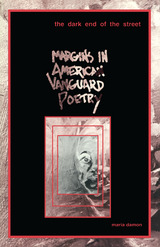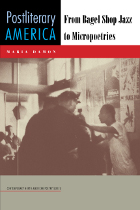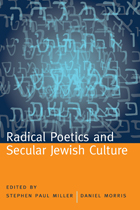3 books about Damon, Maria

Dark End Of The Street
Margins in American Vanguard Poetry
Maria Damon
University of Minnesota Press, 1993

Postliterary America
From Bagel Shop Jazz to Micropoetries
Maria Damon
University of Iowa Press, 2011
In this capacious and challenging book, Maria Damon surveys the poetry and culture of the United States in two distinct but inextricably linked periods. In part 1, “Identity K/not/e/s,” she considers the America of the 1950s and early 1960s, when contentious and troubled alliances took shape between different marginalized communities and their respective but overlapping bohemias—Jews, African Americans, the Beats, and gays and lesbians. Using a rich trove of texts and artifacts—ranging from Gertrude Stein’s writings about her own Jewishness to transcripts from Lenny Bruce’s obscenity trial, Bob Kaufman’s Beat poetry—as well as her own stake in the material, Damon plumbs the complexities of social identity and expressive cultures to fascinating effect.
Always erudite but never effete, Damon then turns to more contemporary issues and broader topics of poetics: micropoetries, cyberpoetics, spoken-word poets, performance poets, and their communities. Echoing many of the themes of the first section of the book, including poetic identity and the troubled nature of the poetic “I,” part 2’s “Poetics for a Postliterary America” goes on to paint a wider picture, dwelling less on close readings of individual poems and more on asking questions about the nature of poetry itself and its role in community formation and individual survival. Discussions of counterperformance, kinetics, the Nuyoricans, Latino identity, and electronic poetics enliven this section.
Never reluctant to acknowledge the deeply personal origins of the work at hand, Damon cleaves to the subject matter, be it questions of identity, matters of poetry, or what it means to live in a postliterary culture. In doing so, she dares to ask what it means to be a member of the “shadow people”—those who occupy marginalized, nocturnal counterculture—creating verbal art.
[more]

Radical Poetics and Secular Jewish Culture
Edited by Stephen Paul Miller and Daniel Morris
University of Alabama Press, 2009
"What have I in common with Jews? I hardly have anything in common with myself!"
--Franz Kafka
Kafka's quip--paradoxical, self-questioning, ironic--highlights vividly some of the key issues of identity and self-representation for Jewish writers in the 20th century. No group of writers better represents the problems of Jewish identity than Jewish poets writing in the American modernist tradition--specifically secular Jews: those disdainful or suspicious of organized religion, yet forever shaped by those traditions.
This collection of essays is the first to address this often obscured dimension of modern and contemporary poetry: the secular Jewish dimension. Editors Daniel Morris and Stephen Paul Miller asked their contributors to address what constitutes radical poetry written by Jews defined as "secular," and whether or not there is a Jewish component or dimension to radical and modernist poetic practice in general. These poets and critics address these questions by exploring the legacy of those poets who preceded and influenced them--Stein, Zukofsky, Reznikoff, Oppen, and Ginsberg, among others.
While there is no easy answer for these writers about what it means to be a Jew, in their responses there is a rich sense of how being Jewish reflects on their aesthetics and practices as poets, and how the tradition of the avant-garde informs their identities as Jews. Fragmented identities, irony, skepticism, a sense of self as "other" or "outsider," distrust of the literal, and belief in a tradition that questions rather than answers--these are some of the qualities these poets see as common to themselves, the poetry they make, and the tradition they work within.
--Franz Kafka
Kafka's quip--paradoxical, self-questioning, ironic--highlights vividly some of the key issues of identity and self-representation for Jewish writers in the 20th century. No group of writers better represents the problems of Jewish identity than Jewish poets writing in the American modernist tradition--specifically secular Jews: those disdainful or suspicious of organized religion, yet forever shaped by those traditions.
This collection of essays is the first to address this often obscured dimension of modern and contemporary poetry: the secular Jewish dimension. Editors Daniel Morris and Stephen Paul Miller asked their contributors to address what constitutes radical poetry written by Jews defined as "secular," and whether or not there is a Jewish component or dimension to radical and modernist poetic practice in general. These poets and critics address these questions by exploring the legacy of those poets who preceded and influenced them--Stein, Zukofsky, Reznikoff, Oppen, and Ginsberg, among others.
While there is no easy answer for these writers about what it means to be a Jew, in their responses there is a rich sense of how being Jewish reflects on their aesthetics and practices as poets, and how the tradition of the avant-garde informs their identities as Jews. Fragmented identities, irony, skepticism, a sense of self as "other" or "outsider," distrust of the literal, and belief in a tradition that questions rather than answers--these are some of the qualities these poets see as common to themselves, the poetry they make, and the tradition they work within.
[more]
READERS
Browse our collection.
PUBLISHERS
See BiblioVault's publisher services.
STUDENT SERVICES
Files for college accessibility offices.
UChicago Accessibility Resources
home | accessibility | search | about | contact us
BiblioVault ® 2001 - 2024
The University of Chicago Press









